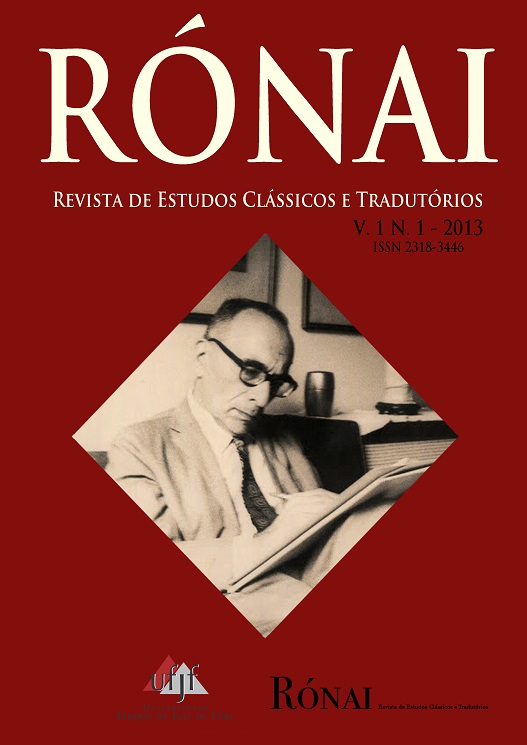Terêncio, a tradição e o estabelecimento do autor
Palavras-chave:
comédia palliata, poética, tradição, Terêncio, prólogos terencianosResumo
Podemos inferir uma “poética” e, sobretudo, a tradição da comédia palliata tal qual definida por Terêncio (cujos recursos e autores ele procuraria emular) a partir de considerações do comediógrafo, tecidas nos prólogos de suas comédias, sobre a composição de uma palliata, as dificuldades para o ingresso na carreira teatral à época republicana em Roma e seu estabelecimento como sucessor de uma tradição de autores que ele próprio elenca.
Downloads
Referências
BRANDÃO, J. L. L. “Vida suetoniana de Terêncio. Estrutura e estratégias de defesa do poeta”. In Estudios sobre Terencio, 2006, p. 111-123.
BROWN, P. Terence: The Comedies (tr. intr. e notas). New York: Oxford, 2006.
CABOLI, G. “I termini della critica letteraria in Terenzio: appunti per um prolegomeno”, Voces, vol. 4, 1993, p. 41-54.
CONTE, G. B. Latin literature – A history. Baltimore: Johns Hopkins, 1994
DUCKWORTH, G. E. The Nature of Roman Comedy: A Study in Popular Entertainment. New Jersey: Princeton University Press, 1994.
DUPONT, Florence. “Recitatio and the Space of Public Discourse", in The Roman Cultural Revolution. Cambridge University Press, 1997.
FRANK, T. “Terence's Contribution to Plot-Construction”, The American Journal of Philology, vol. 49 nº 4, 1928, p. 309-322.
GLARE, P. G. W. (ed.) Oxford Latin Dictionary (OLD). Oxford: Clarendon Press.
GOLDBERG, S. M. Understanding Terence. N. Jersey: Princeton University Press, 1986.
GOWERS, E. “The Plot Thickens: Hidden Outlines in Terence's Prologues”, Ramus, vol. 33, 2004, p. 150-166.
MANUWALD, G. Roman Republican Theatre: A History. Cambridge: Cambridge University Press., 2011.
MAROUZEAU J. (ed.) Térence: Comédies. Paris, Les Belles Lettres, 2 v., 1947.
MCELDUFF, S. “More than Menander's acolyte: Terence as translator”, Ramus, vol. 33, 2004, p. 120-129.
MCGILL S. Plagiarism in Latin Literature. Cambridge University Press, 2012.
PARKER, H. N. “Plautus vs. Terence: Audience and popularity re-examined”, American Journal of Philology, vol. 117, nº 4, 1986, p. 585-617.
ROLFE, J. C. Suetonius – Vol. II. Cambridge, Mass.: Harvard University Press, 1959.
SHARROCK, A. Reading Roman Comedy: Poetics and Playfulness in Plautus and Terence. New York: Cambridge University Press, 2009.
SARGEAUNT J. (ed.) Terence vol. I: The Lady of Andros, The Self-Tormentor, The Eunuch (tr. intr. e notas). London: William Heinemann, 1912.
________________ Terence vol. II: Phormio, the Mother-In-law, the Brothers (tr. intr. e notas). London: William Heinemann, 1912.
WESSNER, P. Aeli Donati Commentum Terenti - Vol. II. Stuttgart, 1962.
WRIGHT, J. Dancing in Chains. The Stylistic Unity of the Comoedia Palliata. Rome: American Academy, 1974.
Downloads
Publicado
Como Citar
Edição
Seção
Licença
Copyright (c) 2015 Rónai – Revista de Estudos Clássicos e Tradutórios

Este trabalho está licenciado sob uma licença Creative Commons Attribution 4.0 International License.
Direitos Autorais
Autores que publicam nesta revista concordam com os seguintes termos:
1. Autores e autoras mantém os direitos autorais e concedem à revista o direito de primeira publicação, sendo a publicação licenciada sob a Creative Commons Attribution License 4.0 Internacional.
2. Os autores e autoras têm permissão e são estimulados(as) a publicar e compartilhar o trabalho com reconhecimento da publicação inicial nesta revista.
3. Os autores e autoras dos trabalhos aprovados autorizam a revista a ceder o conteúdo de seus trabalhos, após sua publicação, para reprodução em indexadores de conteúdo, bibliotecas virtuais e similares.
Para mais informações sobre a Creative Commons Attribution 4.0 International License, acessar: https://creativecommons.org/licenses/by/4.0/
Isenção editorial
O conteúdo dos artigos publicados é de inteira e exclusiva responsabilidade de seus autores, não representando a posição oficial da Rónai - Revista de Estudos Clássicos e Literários ou do Faculdade de Letras da Universidade Federal de Juiz de Fora ou das instituições parceiras.



